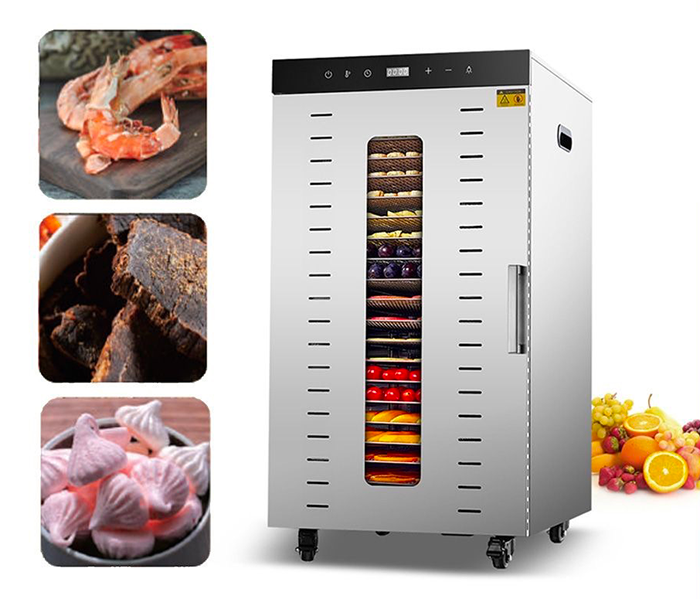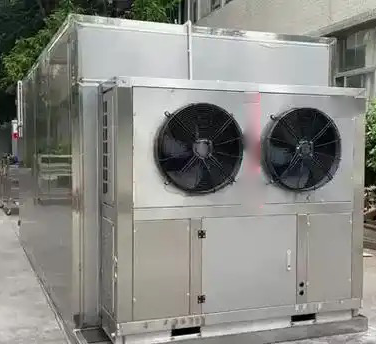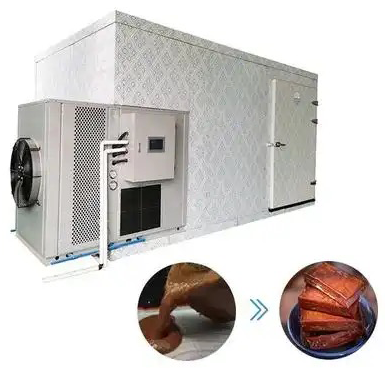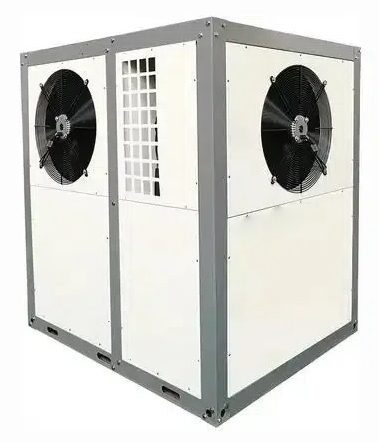
Content Menu
● What is a Heat Pump Dryer?
● Advantages of Using a Heat Pump Dryer
>> Energy Efficiency
>> Gentle Drying Process
>> Versatility
>> Reduced Risk of Over-Drying
>> Space-Saving Design
● Disadvantages of Using a Heat Pump Dryer
>> Initial Cost
>> Longer Drying Times
>> Maintenance Requirements
>> Limited Availability
● Choosing the Best Heat Pump Dryer for Food Drying
● Best Practices for Using a Heat Pump Dryer
● The Science Behind Heat Pump Drying Technology
● Applications of Heat Pump Dryers in Food Industry
● Environmental Impact of Heat Pump Dryers
● Conclusion
● Frequently Asked Questions (FAQs)
>> 1. What types of foods can be dried using a heat pump dryer?
>> 2. How does a heat pump dryer compare to traditional dehydrators?
>> 3. Can I use my heat pump dryer outdoors?
>> 4. How do I maintain my heat pump dryer?
>> 5. Are there any safety concerns with using a heat pump dryer?
Food preservation is an essential practice in both home kitchens and industrial settings. Among the various methods available, using a heat pump dryer has gained popularity due to its efficiency and effectiveness. This article explores the pros and cons of using a heat pump dryer specifically for food drying, while also providing insights into the best practices for selecting and utilizing these machines.

What is a Heat Pump Dryer?
A heat pump dryer is an advanced drying technology that uses a refrigeration cycle to remove moisture from food products. Unlike traditional dryers that expel hot air, heat pump dryers recycle air, making them more energy-efficient. This technology is particularly beneficial for preserving the nutritional value, flavor, and texture of food.
Advantages of Using a Heat Pump Dryer
Energy Efficiency
One of the most significant advantages of heat pump dryers is their energy efficiency. They consume less electricity compared to conventional electric dryers, which can lead to substantial savings on energy bills over time. The ability to recycle air means that less energy is wasted, making it an eco-friendly option for food drying.
Gentle Drying Process
Heat pump dryers operate at lower temperatures than traditional drying methods. This gentle drying process helps to retain the quality of the food, preserving vitamins and minerals that might otherwise be lost during high-temperature drying. As a result, foods dried using heat pump technology often have better flavor and nutritional profiles.
Versatility
Heat pump dryers are versatile machines that can handle a wide variety of food products, including fruits, vegetables, herbs, and meats. This flexibility makes them suitable for both commercial and home use, allowing users to dry different types of foods without needing multiple machines.
Reduced Risk of Over-Drying
The controlled environment within a heat pump dryer minimizes the risk of over-drying food products. This feature is crucial for maintaining the desired texture and taste of dried foods. Users can achieve consistent results with minimal effort.
Space-Saving Design
Many modern heat pump dryers are designed to be compact and space-saving. This aspect makes them ideal for small kitchens or production facilities where space is at a premium. Their sleek design often allows them to fit seamlessly into existing setups.
Disadvantages of Using a Heat Pump Dryer
Initial Cost
While heat pump dryers offer long-term savings on energy bills, their initial purchase price can be higher than traditional dryers. For small-scale operations or home users on a tight budget, this upfront cost may be a barrier.
Longer Drying Times
Heat pump dryers typically have longer drying times compared to conventional methods. While this slow drying process can enhance food quality, it may not be suitable for users who require quick results or need to process large quantities in a short time frame.
Maintenance Requirements
Heat pump dryers require regular maintenance to ensure optimal performance. Users must clean filters and check for any blockages in the system periodically. Neglecting maintenance can lead to decreased efficiency and potential breakdowns.

Limited Availability
Depending on your location, finding the best heat pump dryer specifically designed for food drying may be challenging. Some regions may have limited options available in stores or online.
Choosing the Best Heat Pump Dryer for Food Drying
When selecting the best heat pump dryer for your needs, consider the following factors:
- Capacity: Choose a model that can accommodate your typical batch sizes.
- Temperature Control: Look for units with adjustable temperature settings to cater to different food types.
- Energy Rating: Opt for models with high energy efficiency ratings to maximize savings.
- User-Friendly Features: Consider machines with digital controls or pre-set programs for ease of use.
- Brand Reputation: Research brands known for quality and customer service in the food drying industry.
Best Practices for Using a Heat Pump Dryer
To get the most out of your heat pump dryer, follow these best practices:
- Pre-Treat Foods: For certain fruits and vegetables, consider pre-treating them with lemon juice or blanching before drying to enhance flavor and color retention.
- Cut Uniformly: Ensure that all food pieces are cut into uniform sizes to promote even drying.
- Avoid Overloading: Do not overload the dryer; this can hinder airflow and lead to uneven drying results.
- Monitor Progress: Regularly check on your foods during the drying process to avoid over-drying or under-drying.
- Store Properly: Once dried, store foods in airtight containers in a cool, dark place to maintain freshness.
The Science Behind Heat Pump Drying Technology
Heat pump drying technology operates on principles that enhance both efficiency and product quality. The system consists of several key components including:
1. Evaporator: This component absorbs moisture from the air within the drying chamber by cooling it down.
2. Compressor: The compressor increases the pressure of the refrigerant gas, allowing it to absorb more heat during its cycle.
3. Condenser: In this stage, moisture collected from the evaporator is removed as liquid water while heating up the air before it's sent back into the chamber.
This cycle allows heat pumps to effectively recover latent heat from moisture removal processes, making them significantly more efficient than traditional dryers which lose most of their energy as waste heat.
Applications of Heat Pump Dryers in Food Industry
Heat pump dryers are increasingly being used across various sectors in the food industry due to their ability to maintain quality while reducing energy consumption:
- Fruit Drying: Heat pumps preserve color and flavor better than conventional methods, making them ideal for fruits like apples, bananas, and berries.
- Vegetable Drying: Vegetables retain their nutritional value when dried at lower temperatures using this technology.
- Herb Drying: Delicate herbs benefit from gentle drying processes that prevent loss of essential oils.
- Meat Drying: Heat pumps are also effective in producing jerky or dried meats while ensuring safety through proper moisture removal.
Environmental Impact of Heat Pump Dryers
The environmental benefits associated with heat pump dryers are considerable:
- Lower Carbon Footprint: By consuming less energy than conventional dryers, they contribute less greenhouse gas emissions.
- Waste Reduction: Efficient moisture removal means less spoilage and waste in food production processes.
- Sustainable Practices: Many businesses are adopting heat pump technology as part of their commitment to sustainability and eco-friendly practices.
Conclusion
Heat pump dryers represent an innovative solution for food preservation, combining energy efficiency with high-quality results. While they come with some drawbacks such as higher initial costs and longer drying times, their advantages make them an appealing choice for both commercial producers and home users alike. By understanding how to select and use these machines effectively, you can enjoy deliciously dried foods while minimizing your environmental impact.

Frequently Asked Questions (FAQs)
1. What types of foods can be dried using a heat pump dryer?
Heat pump dryers can effectively dry a wide range of foods including fruits (like apples and bananas), vegetables (such as carrots and peppers), herbs (like basil and thyme), meats (like jerky), and even flowers.
2. How does a heat pump dryer compare to traditional dehydrators?
Heat pump dryers are generally more energy-efficient than traditional dehydrators. They operate at lower temperatures which helps preserve nutrients better but may require longer drying times.
3. Can I use my heat pump dryer outdoors?
While it's possible to use some models outdoors if they are designed for such use, most heat pump dryers are intended for indoor operation due to their need for stable ambient temperatures.
4. How do I maintain my heat pump dryer?
Regular maintenance includes cleaning filters after each use, checking hoses for blockages, ensuring proper airflow around the unit, and occasionally inspecting electrical components for wear.
5. Are there any safety concerns with using a heat pump dryer?
As with any electrical appliance, ensure that your unit is properly installed according to manufacturer guidelines. Avoid overloading it beyond its capacity and keep it clean to prevent overheating.












